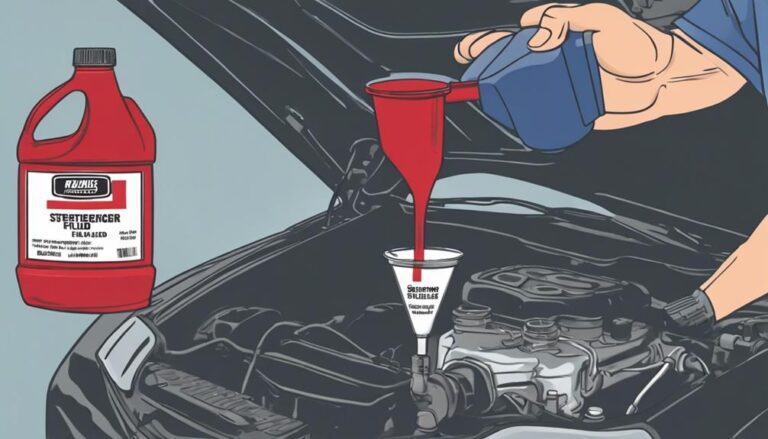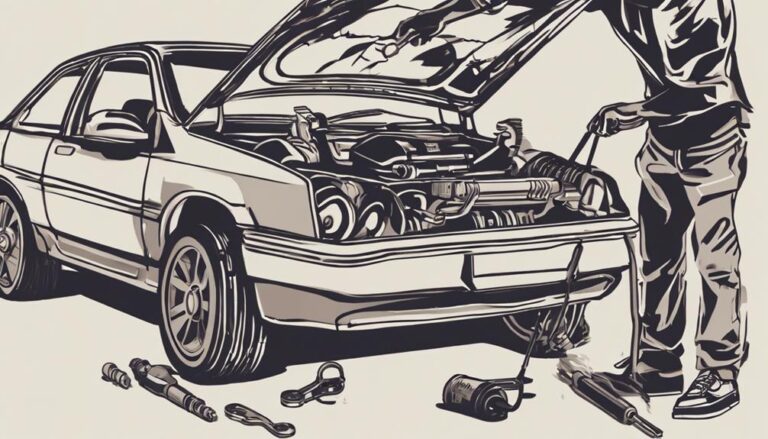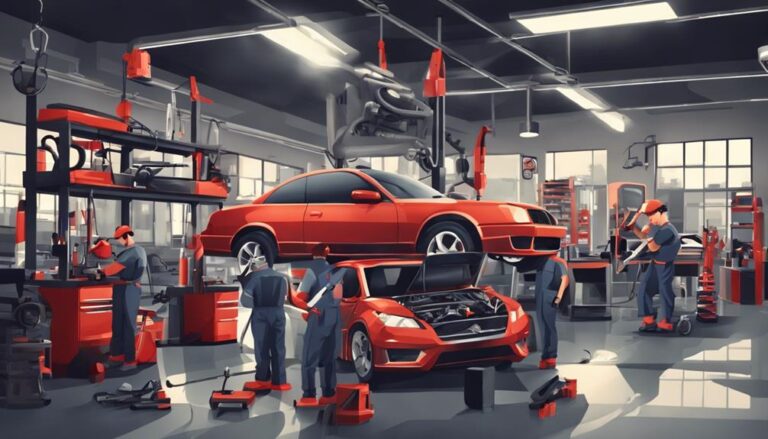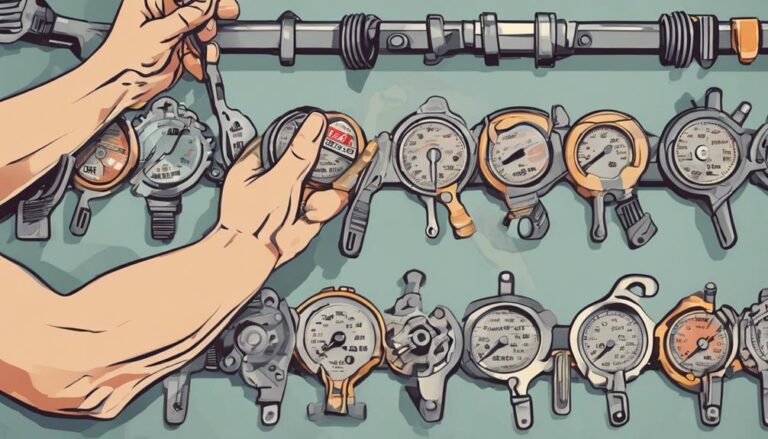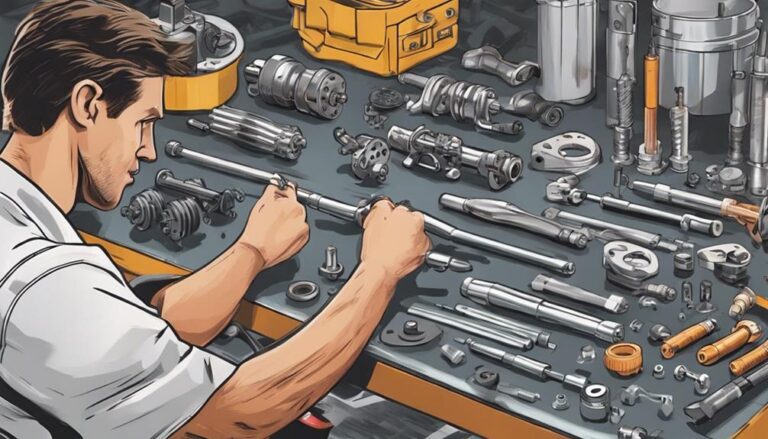Troubleshooting Causes of Hard-to-Turn Steering Wheel
Imagine gripping the steering wheel, feeling the resistance as you try to navigate a turn. You start to wonder what could be causing this difficulty in maneuvering your vehicle.
Could it be a simple issue like low power steering fluid, or something more complex like a malfunctioning power steering pump? Understanding the potential causes of a hard-to-turn steering wheel is the first step in resolving this frustrating problem.
By exploring various troubleshooting methods, you can regain control and ensure a smoother driving experience.
Key Takeaways
- Regular maintenance prevents power steering fluid leaks, ensuring proper hydraulic pressure.
- Timely fluid changes maintain steering efficiency by preventing thickening and contamination.
- Malfunctioning power steering pump leads to increased steering effort, necessitating replacement for normal function.
- Damaged steering rack causes stiffness, requiring prompt attention or replacement for road safety.
Power Steering Fluid Leakage
If you notice a significant decrease in power steering fluid levels, your steering wheel may become harder to turn due to potential leaks in the system. Preventative maintenance is key in preserving the optimal function of your power steering system. Regularly checking and maintaining the power steering fluid level is crucial to avoid potential leaks that could lead to stiff steering.
Ensuring that the power steering fluid is at the proper level will help maintain the hydraulic pressure required for smooth steering operation. Neglecting to address power steering fluid leaks promptly can result in a reduction of fluid pressure, affecting the ease with which you can turn the steering wheel. Leaks in the pressurized hose areas are common culprits for reduced fluid levels.
Thickening Power Steering Fluid
Power steering fluid thickens over time due to lack of regular changes, which diminishes its lubrication properties and results in increased steering stiffness. This can compromise safety and make steering more strenuous. Preventive maintenance is crucial to avoid this issue.
- Fluid contamination: Contaminants can accelerate the thickening process, reducing the fluid's effectiveness and causing steering difficulties.
- Preventive maintenance: Regularly changing the power steering fluid is essential to prevent it from thickening, ensuring optimal steering performance.
- Lubrication effectiveness: Thickened fluid fails to lubricate the system adequately, leading to increased friction and hampered steering responsiveness.
Ignoring the signs of thickening power steering fluid can have serious consequences. Taking proactive measures through regular maintenance not only prevents fluid thickening but also preserves the efficiency of your steering system, enhancing overall driving experience and safety.
Malfunctioning Power Steering Pump

Thickening power steering fluid may signal a potential issue with your vehicle's steering system, particularly when considering the malfunctioning power steering pump. When the power steering pump malfunctions, it can lead to an increase in steering effort, causing potential safety hazards. The power steering pump plays a vital role in transferring fluid to assist in smooth steering operation.
DIY replacement of a faulty power steering pump usually ranges from $100 to $200, while professional service may cost around $500. If the power steering pump fails, you may experience stiff steering, emphasizing the importance of addressing the problem promptly. It's crucial to ensure the proper functioning of the power steering pump to maintain optimal steering performance in your vehicle.
To remedy this issue, pump replacement is often necessary to restore normal steering function and avoid further complications with steering effort.
Bad Steering Rack
A damaged steering rack compromises steering performance by causing stiffness and impacting the vehicle's handling and responsiveness. When dealing with a bad steering rack, here are essential points to consider:
- Steering rack replacement: If you notice persistent stiffness in your steering wheel despite other checks, it may be time to consider replacing the steering rack.
- Steering rack maintenance: Regular maintenance, such as checking for leaks, loose bolts, or unusual noises, can help prolong the life of your steering rack and prevent sudden failures.
- Cost considerations: Replacing a faulty steering rack can be a significant expense, ranging from $650 to $1,200, depending on your vehicle's make and model. However, addressing this issue promptly is crucial to ensure your safety on the road.
To maintain optimal steering performance and safety, promptly address any signs of steering rack issues and consider professional assistance for steering rack replacement or maintenance tasks.
Damaged Serpentine Belt
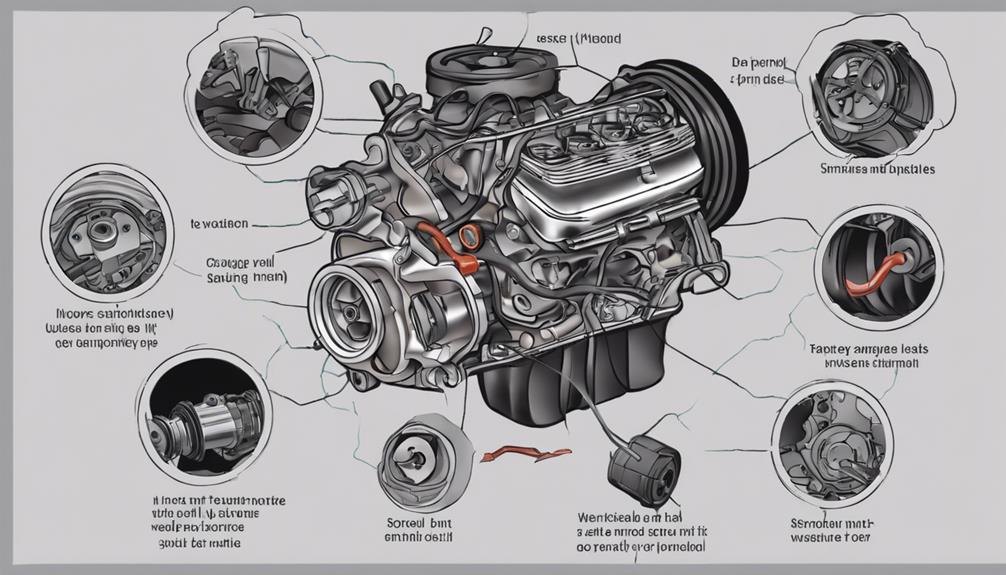
If you're experiencing difficulty steering your vehicle, a potential culprit to consider is a damaged serpentine belt. A worn or cracked serpentine belt can lead to stiffness in steering as it diminishes the power assistance provided to the steering system. This wear and tear can cause the belt to slip, further reducing the effectiveness of the power steering mechanism. It's crucial to address this issue promptly as delaying the replacement of a damaged serpentine belt can result in complete failure, leading to potential overheating of the engine.
Preventive measures play a vital role in mitigating hard-to-turn steering wheel issues caused by a damaged serpentine belt. Regular maintenance checks can help identify signs of wear early on, allowing for timely replacement. When considering replacement options, the cost typically ranges between $110 to $130, making it a relatively affordable fix compared to potential damage from a failed belt. By staying proactive and ensuring the serpentine belt is in good condition, you can avoid the inconvenience and safety hazards associated with steering problems.
Frequently Asked Questions
Why Is My Steering Wheel Hard to Turn All of a Sudden?
If your steering wheel suddenly feels hard to turn, it could be due to low power steering fluid levels or alignment issues with your wheels. Check the power steering fluid and have your alignment inspected to address the problem promptly.
How Do You Diagnose Hard Steering?
When diagnosing hard steering, ensure power steering fluid is at the right level for smooth operation. Examine the steering rack for internal leakage, checking seals meticulously for any issues. Seek professional advice for accurate diagnosis and efficient solutions.
Can Bad Ball Joints Cause Stiff Steering?
If you experience stiff steering, bad ball joints could be the culprit. They cause resistance in your steering system. Prompt ball joint replacement and regular steering system maintenance are crucial. Trust professionals to handle this for optimal performance and safety.
What Is the Most Common Steering Problem?
If you're wondering about the most common steering problem, low power steering fluid levels take the top spot. When fluid is low, steering becomes tough. Keep an eye on fluid levels for smoother wheel alignment.
Conclusion
In conclusion, troubleshooting the causes of a hard-to-turn steering wheel requires attention to detail and prompt action. Addressing issues such as power steering fluid leakage, thickening fluid, malfunctioning pump, bad steering rack, and damaged serpentine belt is crucial for optimal steering performance.
Remember, ensuring your steering system is in top shape can make a world of difference in your driving experience. So, don't delay in addressing these issues to keep your vehicle running smoothly and safely.


